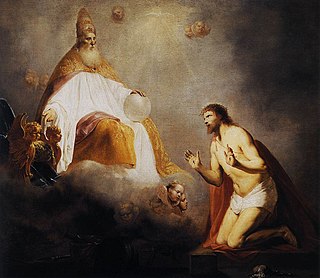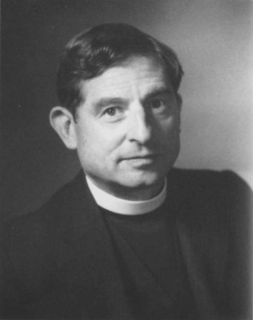
The Acts of the Apostles, often referred to simply as Acts, or formally the Book of Acts, is the fifth book of the New Testament; it tells of the founding of the Christian church and the spread of its message to the Roman Empire.

The Gospel according to Luke, also called the Gospel of Luke, or simply Luke, tells of the origins, birth, ministry, death, resurrection, and ascension of Jesus Christ. Together with the Acts of the Apostles, it makes up a two-volume work which scholars call Luke–Acts; together they account for 27.5% of the New Testament.

The Gospel according to Matthew, also called the Gospel of Matthew, or simply Matthew, is the first book of the New Testament and one of the three synoptic Gospels. It tells how Israel's Messiah, Jesus, comes to his people and forms a community of disciples, how Israel becomes divided and how Jesus condemns this hostile Israel, of how this culminates in his departure from the Temple and his execution; at this point the whole people reject Jesus, and on his resurrection he sends the disciples to the gentiles.
In Abrahamic religions, the Holy Spirit is an aspect or agent of God, by means of which God communicates with people or acts on them.

Luke the Evangelist is one of the Four Evangelists—the four traditionally ascribed authors of the canonical gospels. The Early Church Fathers ascribed to him authorship of both the Gospel of Luke and the Acts of the Apostles, which would mean Luke contributed over a quarter of the text of the New Testament, more than any other author. Prominent figures in early Christianity such as Jerome and Eusebius later reaffirmed his authorship, although a lack of conclusive evidence as to the identity of the author of the works has led to discussion in scholarly circles, both secular and religious.

The New Testament (NT) is the second division of the Christian biblical canon. It discusses the teachings and person of Jesus, as well as events in first-century Christianity. The New Testament's background, the first division of the Christian Bible, is called the Old Testament, which is based primarily upon the Hebrew Bible; together they are regarded as sacred scripture by Christians.

The Ascension of Jesus is Christian teaching that Christ physically departed from Earth by rising into Heaven, in the presence of eleven of his apostles. According to the New Testament narrative, the Ascension occurred forty days after the resurrection. In the Christian tradition, reflected in the major Christian creeds and confessional statements, God exalted Jesus after his death, raising him from the dead and taking him to Heaven, where Jesus took his seat at the right hand of God.
William Barclay was a Scottish author, radio and television presenter, Church of Scotland minister, and Professor of Divinity and Biblical Criticism at the University of Glasgow. He wrote a popular set of Bible commentaries on the New Testament that sold 1.5 million copies.
In Christian theology, baptism with the Holy Spirit, also called baptism in the Holy Spirit or baptism in the Holy Ghost, has been interpreted by different Christian denominations and traditions in a variety of ways due to differences in the doctrines of salvation and ecclesiology. It is frequently associated with incorporation into the Christian Church, the bestowal of spiritual gifts, and empowerment for Christian ministry. Spirit baptism has been variously defined as part of the sacraments of initiation into the church, as being synonymous with regeneration, as being synonymous with Christian perfection that empowers a person for Christian life and service. The term baptism with the Holy Spirit originates in the New Testament, and all Christian traditions accept it as a theological concept.
James Douglas Grant Dunn, also known as Jimmy Dunn, was a British New Testament scholar, who was for many years the Lightfoot Professor of Divinity in the Department of Theology at the University of Durham. He worked broadly within the Protestant tradition.
Ian Howard Marshall was a Scottish New Testament scholar. He was Professor Emeritus of New Testament Exegesis at the University of Aberdeen, Scotland. He was formerly the chair of the Tyndale Fellowship for Biblical and Theological Research; he was also president of the British New Testament Society and chair of the Fellowship of European Evangelical Theologians. Marshall identified as an Evangelical Methodist. He was the author of numerous publications, including 2005 Gold Medallion Book Award winner New Testament Theology.
Luke Timothy Johnson is an American New Testament scholar and historian of early Christianity. He is the Robert W. Woodruff Professor of New Testament and Christian Origins at Candler School of Theology and a Senior Fellow at the Center for the Study of Law and Religion at Emory University.
Graham H. Twelftree is an Australian-born biblical scholar who currently serves as the Academic Dean of London School of Theology in London, UK. Upon earning his master's degree from Mansfield College, Oxford, Twelftree went on to study under world-renowned New Testament scholar James D. G. Dunn at the University of Nottingham. After completing his doctoral dissertation Jesus, the Exorcist: A Contribution to the Study of the Historical Jesus, he went on to author dozens of books and journal articles including perhaps his most noted work Jesus the Miracle Worker: A Historical & Theological Study. Through his writings Twelftree has made a significant contribution to what has been called the third quest for the historical Jesus. He also serves on the editorial board of The Journal for the Study of the Historical Jesus. Before his post at London School of Theology, Twelftree was PhD Program Director and Charles Holman Professor of New Testament and Early Christianity at Regent University's School of Divinity in Virginia Beach, Virginia. He has also served as pastor of a Vineyard church in Adelaide, Australia.

God in Christianity is the eternal being who created and preserves all things. Christians believe God to be both transcendent and immanent. Christian teachings of the immanence and involvement of God and his love for humanity exclude the belief that God is of the same substance as the created universe but accept that God's divine nature was hypostatically united to human nature in the person of Jesus Christ, in an event known as the Incarnation.
Craig S. Keener is a North American academic and professor of New Testament at Asbury Theological Seminary.

The canon of the New Testament is the set of books many Christians regard as divinely inspired and constituting the New Testament of the Christian Bible. For most, it is an agreed-upon list of twenty-seven books that includes the canonical Gospels, Acts, letters attributed to various apostles, and Revelation, though there are many textual variations. The books of the canon of the New Testament were written before 120 AD.
New Covenant Theology is a Christian theological position teaching that the person and work of Jesus Christ is the central focus of the Bible. One distinctive result of this is that Old Testament Laws have been abrogated or cancelled with Jesus' crucifixion, and replaced with the Law of Christ of the New Covenant. It shares similarities with, and yet is distinct from, Dispensationalism and Covenant Theology.

For the majority of Christian denominations, the Holy Spirit, or Holy Ghost, is believed to be the third person of the Trinity, a Triune God manifested as God the Father, God the Son, and God the Holy Spirit, each entity itself being God. Nontrinitarian Christians, who reject the doctrine of the Trinity, differ significantly from mainstream Christianity in their beliefs about the Holy Spirit. In Christian theology, pneumatology refers to the study of the Holy Spirit. Due to Christianity's historical relationship with Judaism, theologians often identify the Holy Spirit with the concept of the Ruach Hakodesh in Jewish scripture, on the theory that Jesus was expanding upon these Jewish concepts. Similar names, and ideas, include the Ruach Elohim, Ruach YHWH, and the Ruach Hakodesh. In the New Testament it is identified with the Spirit of Christ, the Spirit of Truth, the Paraclete and the Holy Spirit.

Ananias and his wife Sapphira were, according to the Acts of the Apostles chapter 5, members of the early Christian church in Jerusalem. The account records their sudden deaths after lying to the Holy Spirit about money.

Hedley Frederick Davis Sparks, was a British biblical scholar and Church of England priest. From 1946 to 1952, he was Cadbury Professor of Theology at the University of Birmingham. From 1952 to 1976, he was Oriel Professor of the Interpretation of Holy Scripture at the University of Oxford.







